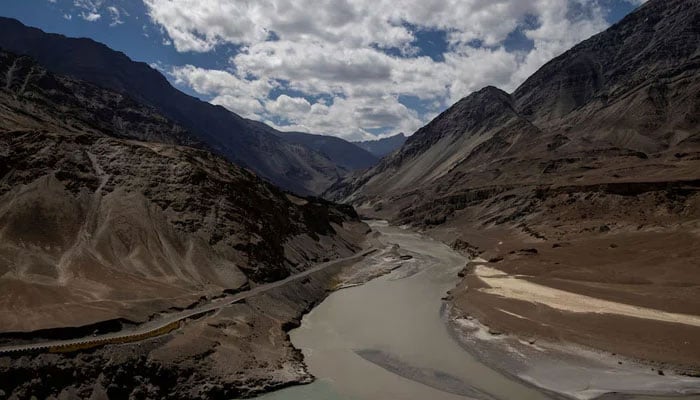Lifeline under threat
Indus Waters Treaty, brokered in 1960 with help of World Bank, survived wars, skirmishes and political upheavals
In a region marred by historical animosities and fragile ceasefires, few issues are as potentially explosive as water. And this becomes obvious in the stern warning given by PPP Chairman Bilawal Bhutto-Zardari: if India attempts to block or restrict Pakistan’s water, war may be the only option left. To some, this may be an OTT response but it is really a necessary reminder of just how close South Asia stands to catastrophe because water – unlike politics – cannot be negotiated away. Bilawal’s remarks are a sobering statement of national survival – "water is our lifeline". His warning follows Indian Prime Minister Narendra Modi’s provocative assertion that Pakistan will not receive water from rivers over which India claims rights. Coupled with India’s unilateral suspension of the Indus Waters Treaty (IWT) during recent tensions, this rhetoric amounts to a dangerous escalation and a violation of both international law and basic human decency.
The Indus Waters Treaty, brokered in 1960 with the help of the World Bank, has survived wars, skirmishes and political upheavals. India’s unilateral decision to hold it in ‘abeyance’ not only undermines this vital framework but strikes at the very heart of Pakistan’s agriculture, economy and national security. No country can, or should be expected to, stand idly by while its water supply is weaponised. It is also clear that India’s decision to flout international norms is part of a disturbing trend. Experts have drawn parallels between New Delhi’s tactics and those employed by Israel in its dealings with Palestinians and its neighbours, including Iran. But South Asia is not the Middle East, and Pakistan is not Gaza. Pakistan is a sovereign state with the capacity, will and resolve to defend its lifelines – peacefully if possible, forcefully if necessary.
This is not to suggest Pakistan wants war. Quite the contrary. Bilawal Bhutto-Zardari went to great lengths to underline Pakistan’s commitment to peace, even in the face of repeated provocations. His recent diplomatic mission to Brussels, Washington, New York and London was a powerful effort to counter Indian disinformation and draw attention to India’s alarming conduct regarding the IWT. The simple truth is: Pakistan prefers diplomacy but will not bow to coercion. Unfortunately, India continues to act with impunity – sponsoring terrorism on Pakistani soil, launching unprovoked attacks and now attempting to strangle Pakistan’s water resources. The international community, particularly signatories and stakeholders of the IWT, must remind India that treaties are not optional, and aggression cloaked in legal ambiguity remains aggression. The threat of war over water is not hyperbole. In a country where the economy relies heavily on irrigation, and where water scarcity already looms as a long-term existential threat, India’s actions are viewed not as policy disagreements but as acts of war. Pakistan has shown remarkable restraint in recent years. That restraint must not be mistaken for weakness. The entire nation understands the stakes.
-
 18-month Old On Life-saving Medication Returned To ICE Detention
18-month Old On Life-saving Medication Returned To ICE Detention -
 Cardi B Says THIS About Bad Bunny's Grammy Statement
Cardi B Says THIS About Bad Bunny's Grammy Statement -
 Major Hollywood Stars Descend On 2026 Super Bowl's Exclusive Party
Major Hollywood Stars Descend On 2026 Super Bowl's Exclusive Party -
 Sarah Ferguson's Silence A 'weakness Or Strategy'
Sarah Ferguson's Silence A 'weakness Or Strategy' -
 Garrett Morris Raves About His '2 Broke Girls' Co-star Jennifer Coolidge
Garrett Morris Raves About His '2 Broke Girls' Co-star Jennifer Coolidge -
 Winter Olympics 2026: When & Where To Watch The Iconic Ice Dance ?
Winter Olympics 2026: When & Where To Watch The Iconic Ice Dance ? -
 Melissa Joan Hart Reflects On Social Challenges As A Child Actor
Melissa Joan Hart Reflects On Social Challenges As A Child Actor -
 'Gossip Girl' Star Reveals Why She'll Never Return To Acting
'Gossip Girl' Star Reveals Why She'll Never Return To Acting -
 Chicago Child, 8, Dead After 'months Of Abuse, Starvation', Two Arrested
Chicago Child, 8, Dead After 'months Of Abuse, Starvation', Two Arrested -
 Travis Kelce's True Feelings About Taylor Swift's Pal Ryan Reynolds Revealed
Travis Kelce's True Feelings About Taylor Swift's Pal Ryan Reynolds Revealed -
 Michael Keaton Recalls Working With Catherine O'Hara In 'Beetlejuice'
Michael Keaton Recalls Working With Catherine O'Hara In 'Beetlejuice' -
 King Charles, Princess Anne, Prince Edward Still Shield Andrew From Police
King Charles, Princess Anne, Prince Edward Still Shield Andrew From Police -
 Anthropic Targets OpenAI Ads With New Claude Homepage Messaging
Anthropic Targets OpenAI Ads With New Claude Homepage Messaging -
 US Set To Block Chinese Software From Smart And Connected Cars
US Set To Block Chinese Software From Smart And Connected Cars -
 Carmen Electra Says THIS Taught Her Romance
Carmen Electra Says THIS Taught Her Romance -
 Leonardo DiCaprio's Co-star Reflects On His Viral Moment At Golden Globes
Leonardo DiCaprio's Co-star Reflects On His Viral Moment At Golden Globes




